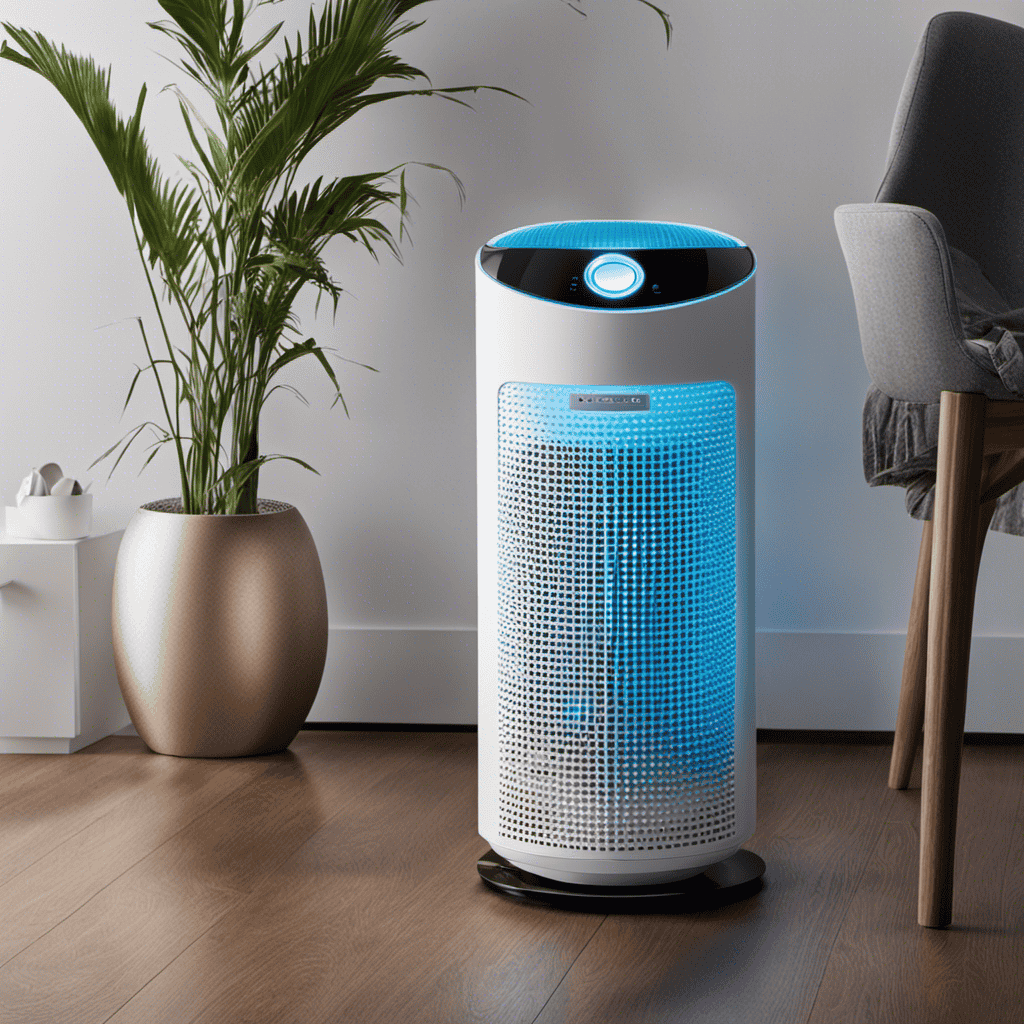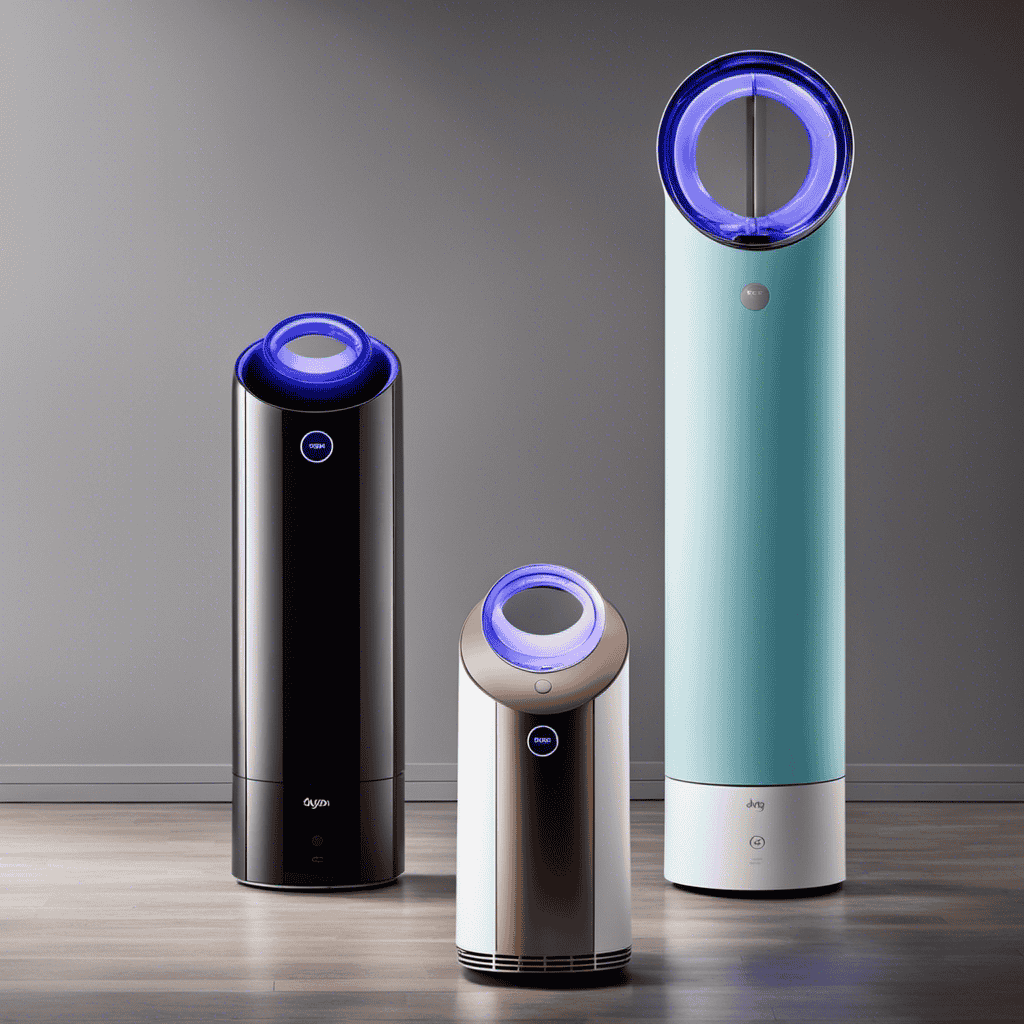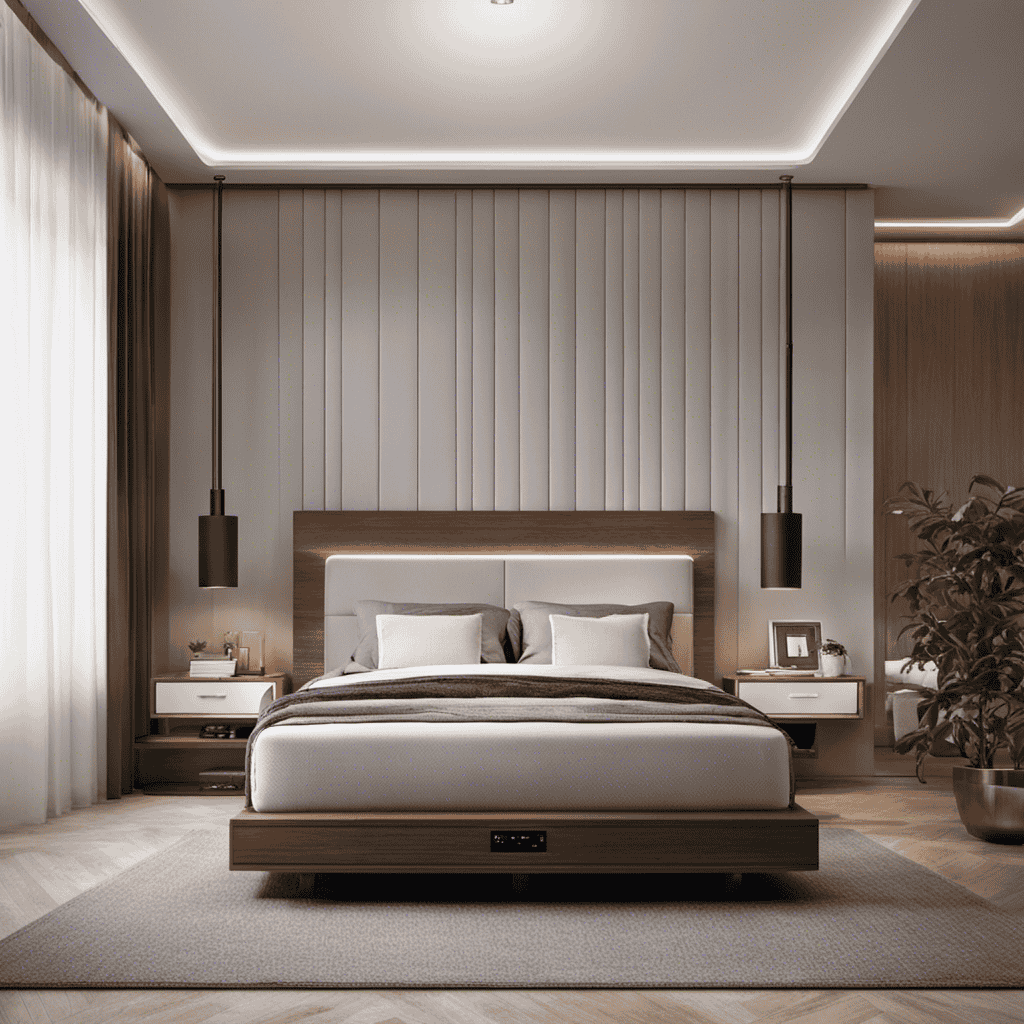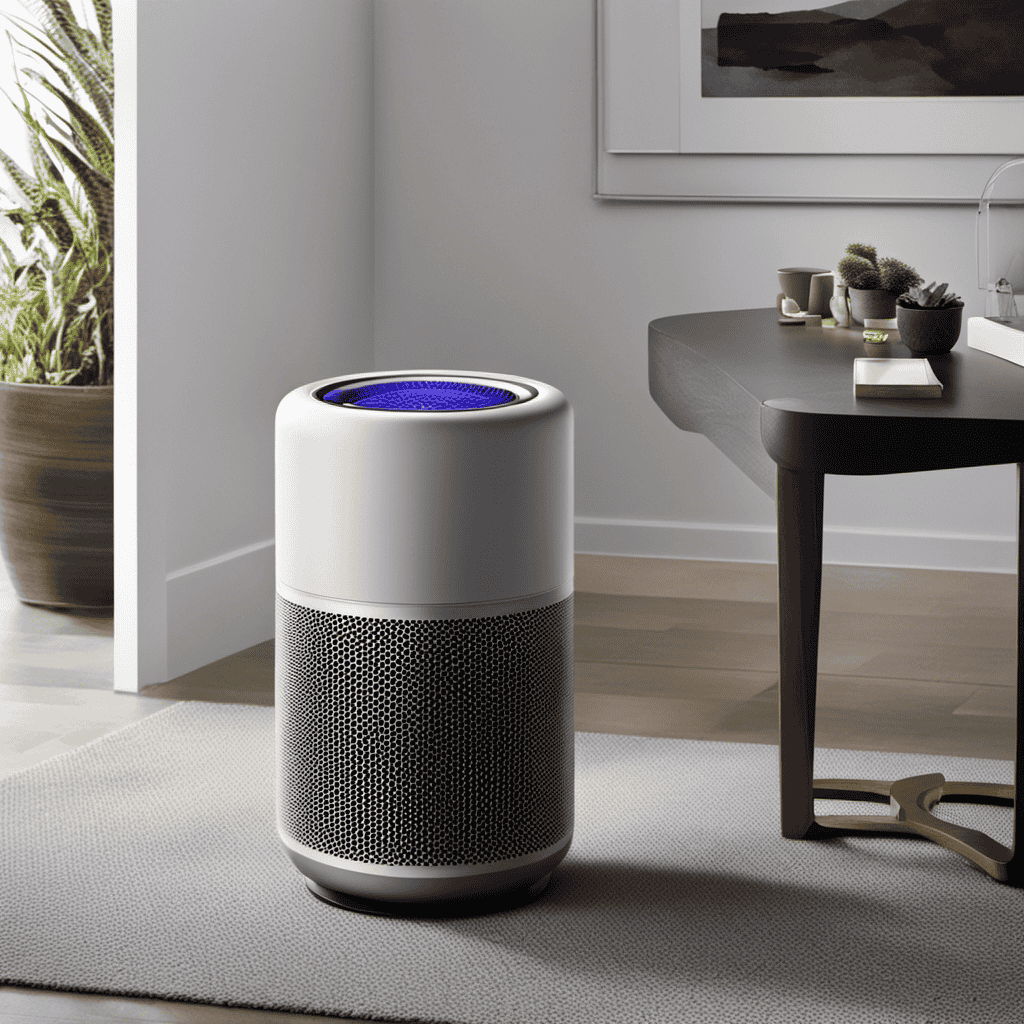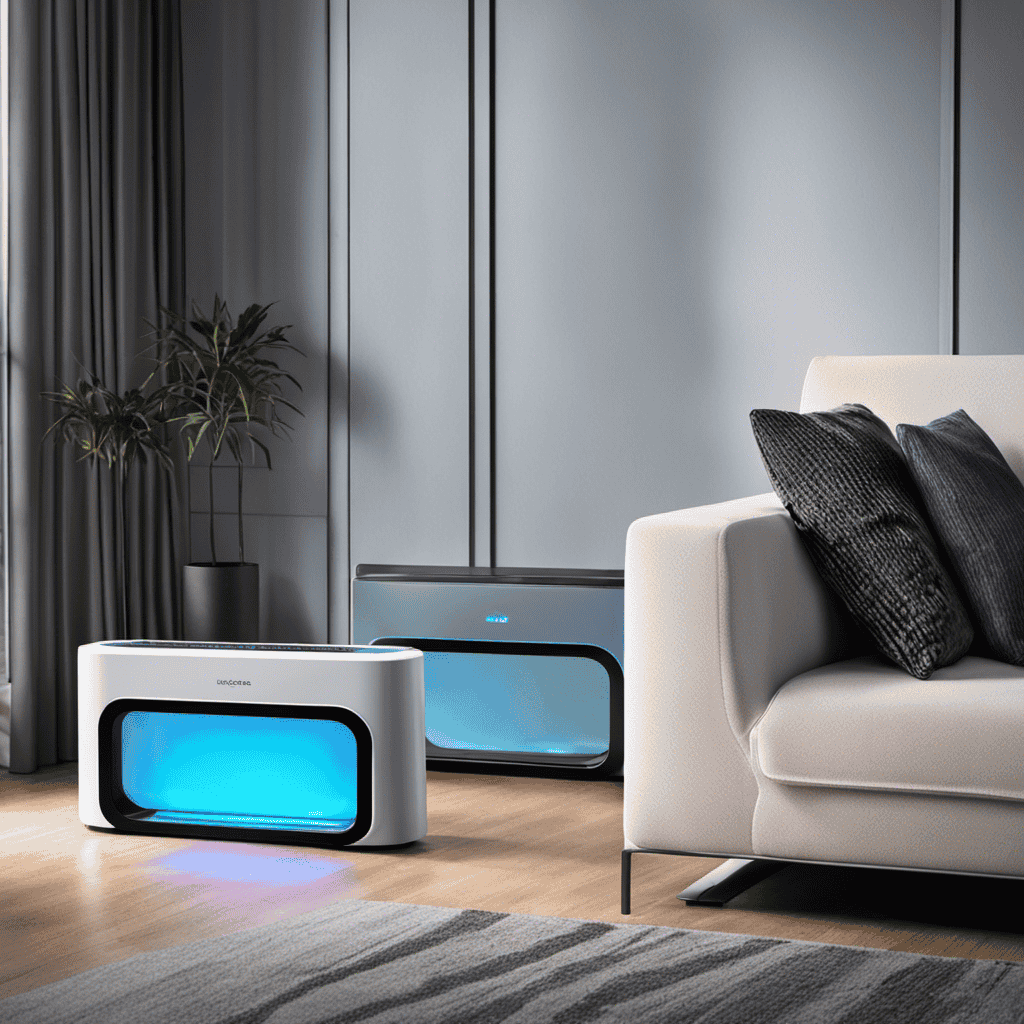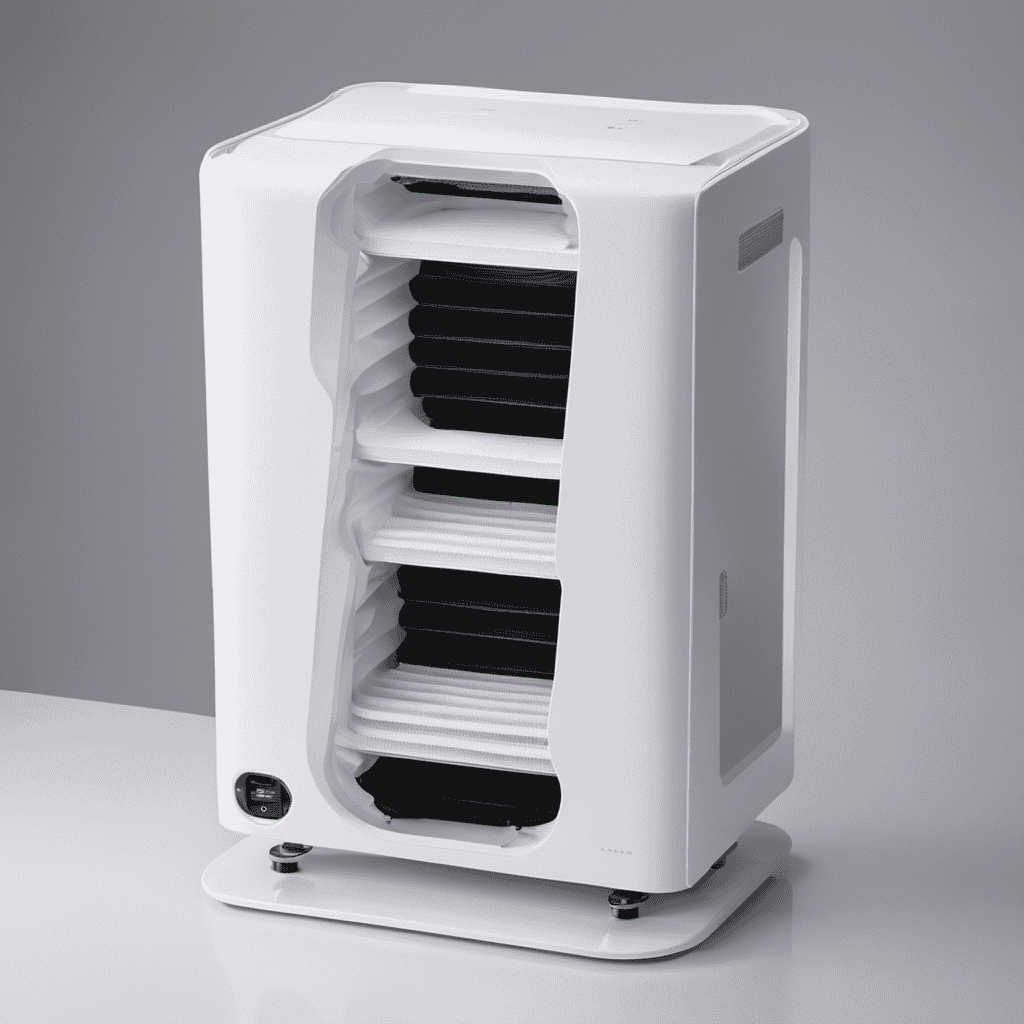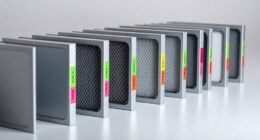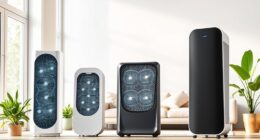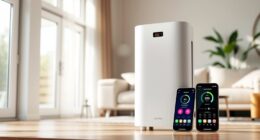When it comes to breathing clean air, it is essential to find the best air purifier. With a wide range of options available, selecting the most suitable one can be daunting. That’s why I am here to assist you in understanding the various types of purifiers and aid you in making a well-informed choice.
From HEPA purifiers to activated carbon and UV-C purifiers, we’ll explore the pros and cons of each. Join me as we delve into the world of air purification and discover which one is best for you.
Key Takeaways
- There are different types of air purifiers available, including those with HEPA filters, activated carbon filters, UV-C purifiers, and ionic purifiers.
- When choosing an air purifier, it is important to consider factors such as the type of filter, suitability for the room size, noise level, and additional features like sleep mode.
- HEPA filters are effective in removing small particles, while activated carbon filters are great for eliminating odors and harmful gases.
- The size of the room should be taken into account when selecting an air purifier, with smaller purifiers suitable for bedrooms or small living areas and larger purifiers more appropriate for living rooms or large offices.
Different Types of Air Purifiers
There are several different types of air purifiers on the market today. One popular choice is the HEPA (High-Efficiency Particulate Air) filter, which is known for its ability to remove small particles from the air.
On the other hand, activated carbon filters excel at trapping odors and chemicals.
When it comes to UV-C versus ionic air purifiers, UV-C uses ultraviolet light to kill bacteria and viruses, while ionic purifiers release negatively charged ions to attract and trap pollutants.
Each type of air purifier has its own strengths and weaknesses, so it’s important to consider your specific needs before making a decision.
Factors to Consider When Choosing an Air Purifier
When it comes to choosing an air purifier, there are several important factors to consider.
First, it is crucial to compare the different types of filters available and determine which one is best suited for your needs.
Additionally, you should evaluate the air purifier’s suitability for your room size and ensure that it can effectively clean the air in the space.
Lastly, considering the noise level of the air purifier is important, as you want a device that operates quietly without causing any disruptions.
Filter Type Comparison
The best air purifier on the market will depend on the filter type you choose. When it comes to air purifier maintenance and ensuring clean air, the filter type plays a crucial role.
Here are three common filter types and their pros and cons:
-
HEPA (High-Efficiency Particulate Air) Filters: These filters are highly effective in removing small particles like dust, pollen, and pet dander. However, they may need frequent replacement, typically every 6 to 12 months.
-
Activated Carbon Filters: These filters excel at eliminating odors, smoke, and harmful gases. They have a longer lifespan compared to HEPA filters but may not be as effective in removing particles.
-
Ionic Filters: These filters use an electrical charge to attract and trap particles. They are low-maintenance and do not require replacement. However, they may produce ozone as a byproduct, which can be harmful in high concentrations.
Choosing the right filter type is essential for maintaining clean air and ensuring the best performance of your air purifier.
Room Size Suitability
HEPA filters are highly effective at removing small particles like dust, pollen, and pet dander, but they may need frequent replacement.
When it comes to choosing an air purifier for small spaces, it’s important to consider the room size suitability. Air purifiers designed for small spaces are typically compact and have a lower Clean Air Delivery Rate (CADR) compared to those meant for larger rooms.
These smaller purifiers are ideal for bedrooms, offices, or small living areas where the air circulation is limited.
On the other hand, air purifiers for large rooms are equipped with more powerful fans and higher CADR ratings to effectively clean the air in bigger areas. They are suitable for living rooms, open-concept spaces, or large offices.
It’s crucial to select the right air purifier size to ensure optimal air quality in your specific room.
Noise Level Consideration
One thing to consider is the noise level of an air purifier before making a purchase. When it comes to creating a peaceful environment, having a silent operation is essential. Many air purifiers now come with sleep mode features that reduce noise levels during the night, ensuring a good night’s sleep. Here are three reasons why the noise level of an air purifier is important:
-
Disturbance: A noisy air purifier can be disruptive, especially if you plan to use it in a bedroom or office space.
-
Sleep quality: Excessive noise can affect your sleep quality, leading to restlessness and fatigue the next day.
-
Concentration: If you need a quiet environment for work or study, a loud air purifier can be distracting and hinder your focus.
Considering the noise level of an air purifier is crucial to ensure a peaceful and productive environment.
Now, let’s explore the pros and cons of HEPA air purifiers.
HEPA Air Purifiers: Pros and Cons
When considering HEPA air purifiers, it is important to examine their effectiveness, noise levels, and operation.
HEPA filters have been proven to be highly effective at capturing particles as small as 0.3 microns, making them ideal for removing allergens and pollutants from the air.
However, it is also important to note that some HEPA air purifiers can be quite noisy, which may be a concern for those who value a quiet environment.
Additionally, understanding how the air purifier operates, such as the fan speed and filter replacement, is crucial in ensuring its optimal performance and longevity.
HEPA Filter Effectiveness
It’s important to consider the effectiveness of the HEPA filter when choosing the best air purifier. The HEPA filter is a key component in removing airborne particles and improving indoor air quality. Here are three important factors to consider regarding HEPA filters:
-
HEPA Filter Maintenance: Regular maintenance is essential to ensure the longevity and effectiveness of the HEPA filter. It’s important to follow the manufacturer’s instructions for cleaning or replacing the filter to maintain optimal performance.
-
HEPA Filter Lifespan: The lifespan of a HEPA filter varies depending on factors such as usage, air quality, and the specific model. Generally, HEPA filters last between six months to two years before needing replacement. Regularly checking the filter’s condition is crucial to ensure its efficiency.
-
Efficiency Ratings: Look for air purifiers with HEPA filters that have a high efficiency rating, such as True HEPA filters that can capture particles as small as 0.3 microns. This ensures that the air purifier effectively removes a wide range of pollutants.
Considering these factors will help you choose an air purifier with an effective HEPA filter for cleaner, healthier indoor air.
Transitioning into the next section, let’s now discuss the importance of noise levels and operation in air purifiers.
Noise Levels and Operation
Considering factors like noise levels and operation is essential when selecting an air purifier for healthier indoor air. Silent operation is a key feature to look for, as it ensures minimal disruption to your daily activities and promotes a peaceful environment. The last thing you want is a loud machine constantly buzzing in the background.
Additionally, energy consumption is another important consideration. Opting for an air purifier that is energy-efficient can help you save on electricity bills while still maintaining a clean and fresh indoor air quality.
Activated Carbon Air Purifiers: How Do They Work
To understand how activated carbon air purifiers work, you can learn about the process of adsorption. Activated carbon has a porous structure that allows it to trap and remove harmful pollutants from the air.
Here are the benefits and drawbacks of using activated carbon air purifiers:
Benefits:
- Effective removal of odors and volatile organic compounds (VOCs).
- Helps improve indoor air quality by capturing allergens and pollutants.
- Can be a cost-effective solution for specific air quality concerns.
Drawbacks:
- Limited effectiveness against larger particles like dust and pet dander.
- Requires regular filter replacement to maintain efficiency.
- May not be sufficient for severe cases of air pollution or specific contaminants.
To maintain activated carbon filters, follow these steps:
- Regularly check and replace filters as recommended by the manufacturer.
- Keep the air purifier in a well-ventilated area to optimize its performance.
- Consider using a pre-filter to extend the lifespan of the activated carbon filter.
UV-C Air Purifiers: Are They Effective
UV-C air purifiers use ultraviolet light to kill or inactivate airborne pathogens like bacteria, viruses, and mold spores. They can be effective in reducing airborne contaminants. However, it is important to consider their safety. UV-C light can be harmful to human health, especially if directly exposed to skin and eyes. Most UV-C air purifiers are designed with safety measures to prevent direct exposure. When used properly, they can help improve indoor air quality by eliminating harmful pathogens.
On the downside, UV-C air purifiers may not be as effective in removing other pollutants like dust, pet dander, or allergens. They also require regular maintenance, such as replacing the UV-C lamps, which can be costly.
Overall, UV-C air purifiers can be a useful tool in reducing airborne pathogens. However, it is essential to use them safely and consider their limitations.
Ionic Air Purifiers: Do They Really Work
Ionic air purifiers, also known as ionizers, are devices that release negatively charged ions into the air to attract and neutralize airborne pollutants like dust, smoke, and pollen. But do they really work? Here are some key points to consider when evaluating the effectiveness of ionic air purifiers:
-
Ionization process: Ionic air purifiers work by emitting ions that attach themselves to pollutants in the air, causing them to become heavy and fall to the ground or stick to surfaces. However, this process may not effectively remove all pollutants from the air.
-
Limited coverage: Ionic air purifiers are typically designed for small spaces, such as bedrooms or offices. They may not be as effective in larger areas or open floor plans.
-
Ozone production: Some ionic air purifiers generate ozone as a byproduct, which can be harmful to human health. It is important to choose an ionizer that produces minimal ozone levels.
While ionic air purifiers can be effective in certain situations, it is crucial to consider their limitations and potential drawbacks before making a purchase decision.
Ozone Air Purifiers: The Good and the Bad
When it comes to ozone air purifiers, there are both pros and cons to consider.
On the one hand, ozone air purifiers are effective at removing odors and killing bacteria and viruses in the air.
However, they can also be harmful to human health, as high levels of ozone can cause respiratory issues and other health problems.
Therefore, it is important to weigh the potential benefits against the safety concerns before deciding to use an ozone air purifier.
Pros and Cons
One of the pros of using an air purifier is that it can help improve indoor air quality. This is particularly important when it comes to air purifiers for babies, as it ensures clean air for infants who are more susceptible to respiratory issues. Air purifiers for offices also play a crucial role in improving air quality in the workplace, creating a healthier environment for employees.
Here are three additional benefits of using an air purifier:
-
Allergen reduction: Air purifiers can effectively remove allergens such as pollen, dust mites, and pet dander from the air, providing relief to individuals with allergies or asthma.
-
Odor elimination: Air purifiers with activated carbon filters can help eliminate unpleasant odors caused by cooking, pets, or tobacco smoke, leaving the air smelling fresh and clean.
-
Improved sleep quality: By removing airborne pollutants and irritants, air purifiers can create a more peaceful and conducive environment for sleep, leading to better sleep quality and overall well-being.
Safety Concerns
Now that we have discussed the pros and cons of different air purifiers, it is important to address the safety concerns associated with indoor air pollution and the potential health risks it poses.
Indoor air pollution is a significant issue that can have detrimental effects on our well-being. Common sources of indoor air pollution include dust, pet dander, mold, and volatile organic compounds (VOCs) emitted by household products. Breathing in these pollutants can lead to various health problems such as allergies, asthma, respiratory infections, and even long-term lung damage.
Therefore, choosing the right air purifier becomes crucial in reducing these risks. Look for purifiers that are certified to remove a wide range of pollutants and have multiple filtration stages to ensure effective purification. Additionally, consider purifiers with high Clean Air Delivery Rates (CADR) for efficient air circulation and regular maintenance to ensure optimal performance and safety.
Air Purifiers for Allergies: What to Look For
Check out what to look for in air purifiers for allergies. When it comes to protecting young ones from allergens, air purifiers for children are essential. Here are three key features to consider when choosing the best air purifier for allergies:
-
HEPA filters: Look for air purifiers that have high-efficiency particulate air (HEPA) filters. These filters can capture small particles, including pollen and pet dander, ensuring cleaner air for allergy sufferers.
-
Activated carbon filters: Air purifiers with activated carbon filters are effective in removing odors and harmful chemicals from the air. This feature is especially beneficial for those with seasonal allergies, as it helps combat pollen and other seasonal triggers.
-
Air quality sensors: Opt for air purifiers that have built-in air quality sensors. These sensors monitor the air and adjust the purification settings accordingly, ensuring optimal air quality at all times.
Air Purifiers for Asthma: A Buying Guide
Consider these key features when purchasing an air purifier to help manage your asthma symptoms. For children with asthma, it is important to choose an air purifier that is specifically designed for their needs. Look for features such as a HEPA filter to remove allergens and a quiet operation to ensure a good night’s sleep. Additionally, consider air purifiers with child-lock features to prevent accidental tampering. For the elderly, air purifiers can provide health benefits by improving indoor air quality and reducing respiratory irritants. Look for features such as a carbon filter to remove odors, and a smart sensor to automatically adjust the purification level based on air quality. With these considerations and features in mind, you can choose the best air purifier to help manage your asthma symptoms.
| Air Purifier for Children | Air Purifier for Elderly |
|---|---|
| HEPA filter | Carbon filter |
| Quiet operation | Odor removal |
| Child-lock features | Smart sensor |
| Allergen removal | Improved indoor air quality |
| Reduced respiratory irritants |
Air Purifiers for Pets: Eliminating Pet Odors and Dander
When it comes to living with pets, it’s important to address the issue of pet odors and dander in the air.
In this discussion, we will explore some effective odor elimination techniques and the importance of using pet-friendly air filters.
Odor Elimination Techniques
One effective way to eliminate odors is by using activated carbon filters in air purifiers. These filters are designed to capture and neutralize odorous particles and chemicals, leaving the air clean and fresh.
However, it’s important to note that regular maintenance is crucial for the optimal performance of air purifiers.
Here are three natural odor elimination techniques that can complement the use of activated carbon filters:
-
Ventilation: Opening windows and allowing fresh air to circulate can help remove stagnant odors from a room.
-
Baking soda: Placing bowls of baking soda around the house can absorb unpleasant odors. It’s a simple and affordable option.
-
Essential oils: Diffusing essential oils like lavender or lemon can not only mask odors but also provide a pleasant aroma in the air.
Pet-Friendly Air Filters
Now that we’ve discussed odor elimination techniques, let’s explore the importance of pet-friendly air filters.
As a pet owner, I understand the challenges of maintaining clean indoor air while keeping our furry friends happy and healthy. Pet-friendly air filters are specifically designed to capture pet dander, hair, and other allergens that can cause respiratory issues. These filters often come with features like activated carbon to help neutralize pet odors.
When choosing a pet-friendly air filter, look for a high-efficiency particulate air (HEPA) filter, as it can effectively remove pet allergens from the air. To ensure optimal performance, it’s crucial to regularly clean or replace the filter as recommended by the manufacturer.
Additionally, vacuuming regularly and grooming your pet can also help reduce the amount of pet dander in your home. By incorporating these pet-friendly features and maintenance tips, you can create a healthier environment for both you and your beloved pets.
Air Purifiers for Smoke: Removing Cigarette and Cooking Odors
If you’re dealing with cigarette or cooking odors, an air purifier can help eliminate them effectively. When it comes to air purifiers for smokers, there are a few options that excel at tobacco odor removal. These include:
-
HEPA Filters: High-Efficiency Particulate Air filters are designed to capture tiny particles, including smoke particles and odors.
-
Activated Carbon Filters: These filters are specifically designed to absorb odors and chemicals, making them great for eliminating tobacco smells.
-
Air Purifiers with Odor Eliminating Technology: Some air purifiers are equipped with additional features, such as ozone generators or UV-C light, which can help break down and neutralize odors.
For kitchens, air purifiers can be used to effectively eliminate cooking smells. Look for air purifiers with a combination of HEPA filters and activated carbon filters, as these will be most effective at capturing and neutralizing cooking odors.
Now, let’s move on to the next section about air purifiers for mold: preventing and removing mold spores.
Air Purifiers for Mold: Preventing and Removing Mold Spores
To effectively prevent and remove mold spores, you’ll want to consider an air purifier with a HEPA filter and a UV-C light. Mold prevention techniques are essential in maintaining a healthy indoor environment.
Mold spores are common in areas with high humidity or moisture levels, such as bathrooms and basements. These spores can cause allergies and respiratory issues if not properly addressed.
An air purifier with a HEPA filter can trap and remove mold spores from the air, ensuring cleaner and fresher indoor air quality. The UV-C light, on the other hand, is effective in killing airborne mold spores and preventing their growth.
By combining these two features, you can significantly reduce the presence of mold spores in your home.
Now, let’s move on to air purifiers for dust: clearing the air of dust particles.
Air Purifiers for Dust: Clearing the Air of Dust Particles
Dust particles can be effectively removed from the air by using an air purifier with a high-efficiency filter and an ionizer. Here are three reasons why air purifiers are beneficial for reducing dust in your home:
-
Reducing Allergens in the Air: Air purifiers equipped with HEPA filters can capture tiny dust particles, pollen, and other allergens, providing relief for allergy sufferers. By removing these particles from the air, air purifiers help create a cleaner and healthier environment.
-
Preventing the Spread of Airborne Viruses: Air purifiers with ionizers can help eliminate viruses and bacteria in the air. These ionizers emit ions that attach to airborne particles, causing them to become heavy and fall out of the air. This can help prevent the spread of airborne viruses and reduce the risk of respiratory infections.
-
Improving Indoor Air Quality: By effectively removing dust particles, air purifiers contribute to overall improved indoor air quality. This is especially important for individuals with respiratory conditions or weakened immune systems, as it helps create a cleaner and safer living environment.
By utilizing air purifiers for dust, you can reduce allergens, prevent the spread of viruses, and improve the overall quality of the air in your home.
Now, let’s explore the benefits of air purifiers for VOCs and indoor pollutants.
Air Purifiers for VOCs: Reducing Chemicals and Indoor Pollutants
Air purifiers equipped with activated carbon filters are effective at reducing VOCs and indoor pollutants by absorbing and neutralizing harmful chemicals in the air. These filters are designed to capture and trap volatile organic compounds (VOCs), which are commonly found in household products, paints, and cleaning agents. By removing these chemicals from the air, air purifiers with activated carbon filters help to improve indoor air quality and reduce the risk of respiratory issues caused by exposure to harmful substances.
In addition to VOCs, air purifiers also play a crucial role in protecting against airborne pathogens, such as viruses. Many air purifiers are equipped with HEPA filters, which are capable of capturing tiny particles, including viruses, bacteria, and other microorganisms. This helps to create a healthier environment by reducing the spread of airborne illnesses.
Furthermore, air purifiers can also provide relief for individuals suffering from allergies by reducing pollen and pet dander. HEPA filters are highly efficient at capturing these allergens and preventing them from circulating in the air. This can significantly alleviate symptoms and improve overall comfort for allergy sufferers.
Smart Air Purifiers: The Latest Technology in Air Purification
Smart air purifiers are revolutionizing indoor air purification with their advanced technology and convenient features. Equipped with smart home integration capabilities, these devices can be controlled remotely through smartphone apps or voice commands, making it easier than ever to maintain clean air in our homes.
Here are three key benefits of smart air purifiers:
-
Real-time air quality monitoring: Smart air purifiers have built-in sensors that constantly monitor the air quality in the room. They can detect pollutants, allergens, and even measure the humidity level. This data is then displayed on the device or sent to your smartphone, allowing you to stay informed about the air you breathe.
-
Automated operation: These purifiers can adjust their settings automatically based on the air quality readings. They can increase the fan speed or activate specific filters when the air is more polluted, ensuring optimal purification at all times.
-
Integration with smart home systems: Smart air purifiers can be seamlessly integrated into existing smart home setups. They can be controlled through voice assistants like Amazon Alexa or Google Assistant and can even be programmed to work in sync with other smart devices, such as thermostats or air conditioners, for a truly connected home experience.
With their advanced features and ability to provide real-time data, smart air purifiers are a valuable tool in our quest for cleaner indoor air.
Frequently Asked Questions
Can Air Purifiers Help With Respiratory Conditions Like Asthma and Allergies?
Air purifiers can be effective in reducing allergens and pollutants in the air, which can benefit those with respiratory conditions like asthma and allergies. They help create a cleaner and healthier environment.
How Often Should I Replace the Filters in My Air Purifier?
When it comes to air purifier maintenance, it’s crucial to know when to replace filters. Signs of a dirty filter include reduced airflow and a decrease in purifying efficiency. Regularly replacing filters ensures optimal performance.
Are Air Purifiers Safe to Use Around Children and Pets?
Air purifiers can be safe around children and pets, but it’s important to choose one that is effective and doesn’t pose any potential health risks. Research different models and consider factors like filtration technology and noise levels.
Can Air Purifiers Remove Odors From Cooking or Cigarette Smoke?
Air purifiers can effectively eliminate odors from cooking and cigarette smoke. They are particularly useful for removing pet odors and dander. Their efficient filtration system ensures a fresh and clean indoor environment.
Are Smart Air Purifiers Worth the Investment?
Smart air purifiers are definitely worth the investment. With advancements in air purifier technology and the integration of smart home automation, these devices are more efficient and convenient than ever before.
Conclusion
In conclusion, after thoroughly analyzing the different types of air purifiers, it is clear that there is no one-size-fits-all answer to the question of which is the best air purifier.
Each type has its own strengths and weaknesses, and the choice ultimately depends on individual needs and preferences. However, it is crucial to consider factors such as filtration technology, room size, and air quality concerns when making a decision.
By carefully considering these factors and being aware of the specific needs of your environment, you can make an informed choice and create a healthier indoor environment.
